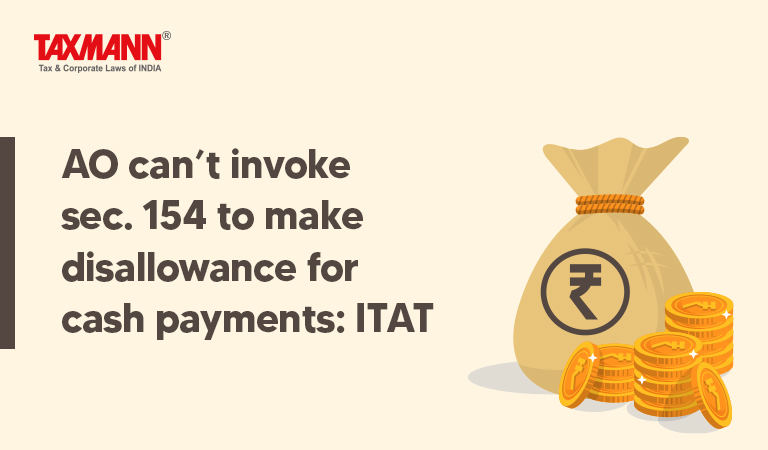AO can’t invoke sec. 154 to make disallowance for cash payments: ITAT
- Blog|News|Income Tax|
- 2 Min Read
- By Taxmann
- |
- Last Updated on 3 June, 2022

Case Details: Smt. Poonam Mittal v. ITO - [2022] 138 taxmann.com 380 (Amritsar-Trib.)
Judiciary and Counsel Details
-
- Ravish Sood, Judicial Member & Dr M.l. Meena, Accountant Member
- Ashray Sarna, CA for the Appellant.
- Rohit Mehra, DR for the Respondent.
Facts of the Case
In the instant case, the Assessing Officer (AO) issued a notice under section 154 calling upon the assessee to explain why the bonus of Rs. 2,47,380 paid in cash should not be disallowed under section 40A(3). Later, rejecting the assessee’s contention, AO passed the order under section 154 making disallowance.
The assessee carried the matter before the CIT(A). However, the CIT(A) confirmed the action of AO and upheld the order passed under section 154. Aggrieved-assessee filed the instant appeal before the Tribunal.
ITAT Held
The Tribunal held that section 40A(3) contemplates disallowance of certain expenditure which is incurred by an assessee in cash beyond the prescribed limit. Further, rule 6DD carves out a set of exceptions wherein the payments despite having been made in cash beyond the aforesaid prescribed limit are not to be disallowed.
AO had invoked his powers under section 154 for making disallowing under section 40A(3).
It is only a mistake apparent from the record, i.e., one which is obvious and patent and not something that can be established by a long drawn process of reasoning on points on which there may conceivably be two opinions that can be rectified within the meaning of section 154.
The disallowance of an amount under section 40A(3) by no means can be brought within the realm of a mistake that could be held as being a mistake that is glaring, patent, apparent and obvious from record.
Thus, AO had grossly erred in invoking the provisions of section 154 to disallow the aforementioned amount under section 40A(3). Thus, the order therein passed by him couldn’t be sustained and was accordingly liable to be vacated.
List of Cases Referred to
-
- T.S. Balaram, ITO v. Volkart Brothers [1971] 82 ITR 50 (SC) (para 8).
Disclaimer: The content/information published on the website is only for general information of the user and shall not be construed as legal advice. While the Taxmann has exercised reasonable efforts to ensure the veracity of information/content published, Taxmann shall be under no liability in any manner whatsoever for incorrect information, if any.

Taxmann Publications has a dedicated in-house Research & Editorial Team. This team consists of a team of Chartered Accountants, Company Secretaries, and Lawyers. This team works under the guidance and supervision of editor-in-chief Mr Rakesh Bhargava.
The Research and Editorial Team is responsible for developing reliable and accurate content for the readers. The team follows the six-sigma approach to achieve the benchmark of zero error in its publications and research platforms. The team ensures that the following publication guidelines are thoroughly followed while developing the content:
- The statutory material is obtained only from the authorized and reliable sources
- All the latest developments in the judicial and legislative fields are covered
- Prepare the analytical write-ups on current, controversial, and important issues to help the readers to understand the concept and its implications
- Every content published by Taxmann is complete, accurate and lucid
- All evidence-based statements are supported with proper reference to Section, Circular No., Notification No. or citations
- The golden rules of grammar, style and consistency are thoroughly followed
- Font and size that’s easy to read and remain consistent across all imprint and digital publications are applied



 CA | CS | CMA
CA | CS | CMA
